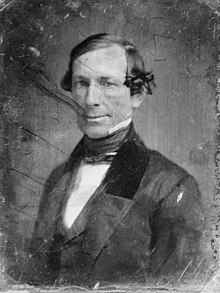
Back فرناندو وود Arabic فرناندو وود ARZ فرناندو وود AZB Fernando Wood German Fernando Wood French Fernando Wood Italian Fernando Wood Polish Fernando Wood Portuguese Fernando Wood SIMPLE 费尔南多·伍德 Chinese
Fernando Wood | |
|---|---|
 Daguerreotype by Mathew Brady, c. 1855 | |
| 73rd and 75th Mayor of New York City | |
| In office January 1, 1855 – December 31, 1857 | |
| Preceded by | Jacob Aaron Westervelt |
| Succeeded by | Daniel F. Tiemann |
| In office January 1, 1860 – December 31, 1861 | |
| Preceded by | Daniel F. Tiemann |
| Succeeded by | George Opdyke |
| Member of the U.S. House of Representatives from New York | |
| In office March 4, 1867 – February 13, 1881 | |
| Preceded by | William A. Darling |
| Succeeded by | John Hardy |
| Constituency | 9th district (1867–1873) 10th district (1873–1875) 9th district (1875–1881) |
| In office March 4, 1863 – March 4, 1865 | |
| Preceded by | William Wall |
| Succeeded by | Nelson Taylor |
| Constituency | 5th district |
| In office March 4, 1841 – March 4, 1843 | |
| Preceded by | Edward Curtis |
| Succeeded by | Jonas P. Phoenix |
| Constituency | 3rd district (Seat B) |
| Personal details | |
| Born | June 14, 1812 Philadelphia, Pennsylvania, U.S. |
| Died | February 13, 1881 (aged 68) Hot Springs, Arkansas, U.S. |
| Political party | Democratic |
| Spouses | Anna Taylor
(m. 1831; div. 1839)Ann Dole Richardson
(m. 1841; died 1859)Alice Fenner Mills (m. 1860) |
| Children | 16, including Henry |
| Relatives | Benjamin Wood (brother) |
| Signature |  |
Fernando Wood (February 14, 1812 – February 13, 1881) was an American Democratic Party politician, merchant, and real estate investor who served as the 73rd and 75th Mayor of New York City.[a] He also represented the city for several terms in the United States House of Representatives.
After rapidly rising through Tammany Hall, Wood served a single term in the U.S. House before returning to private life and building a fortune in real estate speculation and maritime shipping.
He was elected mayor for the first time in 1854 and served three non-consecutive terms. His mayoralty was marked by an almost dictatorial vision of the office and political corruption in the city's appointed offices, including the New York City police force. His political appointments and his advocacy for unilateral reform of the city charter to strengthen his power and grant the city home rule brought him into direct conflict with the Republican state legislature, leading to a charter revision that prematurely ended his second term in office and resulted in his arrest. He returned to the mayor's office for a final term in 1860.
After leaving the mayor's office, Wood was elected to several more terms in the House of Representatives, where he served for sixteen years. In his final two terms in that office, he served as Chairman of the powerful House Committee on Ways and Means.
Throughout his career, Wood expressed political sympathies for the Southern United States, including during the American Civil War. He once suggested to the New York City Council that the city should declare itself an independent city-state in order to continue its profitable cotton trade with the Confederate States of America. In the House, he was a vocal opponent of President Abraham Lincoln and one of the main opponents of the Thirteenth Amendment, which abolished slavery in the United States.
Cite error: There are <ref group=lower-alpha> tags or {{efn}} templates on this page, but the references will not show without a {{reflist|group=lower-alpha}} template or {{notelist}} template (see the help page).
© MMXXIII Rich X Search. We shall prevail. All rights reserved. Rich X Search